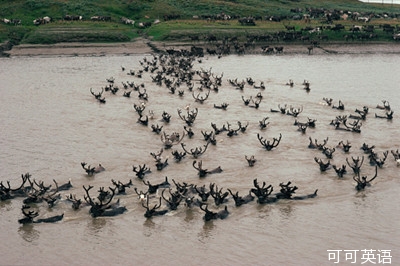There must have been astonishing places ... you can imagine the mammoths, and the herds of horses and deer. And the birds, the migrating birds, I think, had a massive impact on these hunter-gatherers. So I think part of the art is an overwhelming sense of delight and appreciation and celebration of the natural world.'
当时肯定有很多震振人心的地方……你能想像那些猛犸象、大群大群的野马与鹿群。还有形形色色的鸟,各种候鸟,肯定会对当时那些狩猪采集者产生多么巨大的影响。因此,我因为艺术中的一部分是一种让人难以控制的喜悦、一种对大自然世界的赏识与庆贺。”
And an appreciation not just of the animal world - these people know how to make the most of the rocks and minerals.
而且不仅仅是对动物世界的赏识,这些人类已经知道如何物尽其能地利用岩石与矿物。
If you look closely, you can see that this little sculpture is the result, in fact, of four separate stone technologies.
细细观察一下这个小小的雕塑品,你就清楚这是件由四种独立石器工艺制作出来的成果。
First, the tip of the tusk was severed with a chopping tool; then the contours of the animals were whittled with a stone knife and scraper.
首先用砍砸器将这象牙尖从象牙上砍断;然后用石头刀与石刮刀将动物的轮廓削出来。
Then the whole thing was polished using a powdered iron oxide mixed with water, probably buffed up with a chamois leather.
接下来用一种氧化铁和水混合液体来抛光打磨整件物品,极可能是拿着块麂皮来弄的。
And finally the markings on the bodies and the details of the eyes were carefully incised with a stone engraving tool. In execution as well as in conception, this is a very complex work of art. And it seems to me that it has all the qualities of precise observation and interpretation that you'd look for in any great artist.
最后,再利用一种石制雕刻工具对诸如身体与眼神等部位细节进行精雕细琢。无论是实际操作还是概念构思上,这无疑是一件极为复杂的艺术品。在我看来,它完全具备在你能在任何伟大艺术家身上找到的属性,那入微的观察力与精准的表达力。
Why would you go to such trouble to make an object with no practical purpose?
但你怎么可能费那么大心思去创造一件毫无实际用途的物品?
What I think you see in the art of this period is human beings trying to enter fully into the flow of life around them, so that they become part of the whole process of animal life that's going on around them, in a way which I think isn't just about managing the animal world, or guaranteeing them success in hunting or whatever.
“在我看来,这时期你所看到的艺术,反映出人类试图更充分地融入自己周遭的生命之河中,使自己成为这周而复始、生生不息的动物生命过程的一部分;而且在我看来,是通过一种不仅仅是管理动物世界,或者能保证他们成功地捕获猎物之类的方式。我认为意义不止于此。
I think it's more than that. It's really a desire to get inside and almost to be at home in the world at a deeper level, and I think that that's actually a very deeply religious impulse, to be at home in the world.
其实真的是一种渴望,渴望在更深层次上,去认知世界,在世界中寻找到归属感;我觉得这种在世界中寻找归属感的渴望,是具有要当深刻的宗教情绪。
We tend to identify religion with not being at home in the world sometimes, as if , you know, the real stuff were elsewhere in heaven; and yet actually if you look at religious origins, if you look at a lot of the mainstream themes in the great world religions, it's the other way round - it's how to live here and now and how to be part of that flow of life.'
我们习以为常地倾向于把宗教认知为一种超尘出世的感觉,似乎真谛只是存在远方的天堂乐园中;然而假如你追溯回所有宗教的根源,假如你细细观察这世界上所有主流的伟大宗教的主流主题,情况恰恰是相反的——它是关于如何活在现在,活在世上,如何成为生命之流的一部分。”
This carving of the two swimming reindeer had no practical function, only form. Was it just 'art'? An image made just for its beauty? Or does it have a different purpose? By representing something, by making a picture or a sculpture of it, you give it a different kind of life, a kind of magical power, and you assert your relation to it in a world you're able not just to experience, but to imagine. Is it going too far to suggest that art like this is the earliest physical evidence for religion?
这对游水的驯鹿雕刻品其实也没有任何实际功能,具有一种形式。难道它仅仅是“艺术”?一件纯粹为美而制造的形象物品?还是它还蕴含着不同的目的?通过重新诠释一样物品,例如为它绘制一幅画或者雕一件雕塑,你赋于了给另一种全新的生命,一种神奇的力量;同时你不止通过体验,还有想像,重新定位了你与它在这世上间的关系。如果说这样的艺术品便是宗教艺术最早的实物证据,会不会太言过其实了呢?













